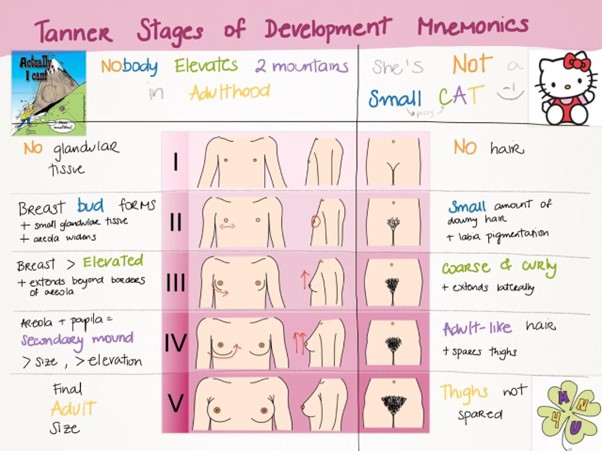Which is assessed with Tanner staging?
Growth hormone secretion
Hormone levels
Hyperthyroidism
Secondary sex characteristic
The Correct Answer is D
Tanner staging is a method used to assess and describe the development of secondary sex characteristics during puberty. It is primarily focused on the physical changes that occur as individuals transition from childhood to adulthood. The Tanner scale consists of different stages (I to V) that describe the development of specific secondarysex characteristics such as breast development, pubic hair growth, genital development, and facial hair growth.
Growth hormone secretion in (option A) is incorrect because While growth hormone does play a role in the overall growth and development of individuals during puberty, Tanner staging does not specifically measure or assessgrowth hormone secretion.
Hormone levels in (option B) is incorrect because While hormone levels, including sex hormones such as estrogenand testosterone, do play a significant role in the development of secondary sex characteristics, Tanner staging itself does not involve measuring or assessing hormone levels. Hormone levels can be assessed through laboratory testing, but this is a separate process from Tanner staging
Hyperthyroidism in (option C) is incorrect because Hyperthyroidism, on the other hand, is a medical condition characterized by an overactive thyroid gland that produces an excessive number of thyroidhormones. It is not directly related to the development of secondary sex characteristics. Diagnosing hyperthyroidism typically involves assessing symptoms, conducting physicalexaminations, and performing specific blood tests to measure thyroid hormone levels and evaluate thyroidfunction.

Nursing Test Bank
Naxlex Comprehensive Predictor Exams
Related Questions
Correct Answer is D
Explanation
The first sign of pubertal change seen with boys is testicular enlargement. This is known as testicular or scrotal growth and is one of the earliest physical signs of puberty in boys. Testicular enlargement is followed by other changes such as the growth of pubic hair, penile growth, voice deepening, and facial hair growth.
voice deepening in (option A) is incorrect because it, typically occurs after testicular enlargement and is associated with the growth and development of the larynx during puberty.
scrotal enlargement in (option B) is incorrect because it, may occur simultaneously or shortly after testicular enlargement as part of overall genital growth during puberty.
, facial hair growth in (option C) is incorrect because it, is a later sign of pubertal development in boys and typically occurs after the initial testicular enlargement and growth of pubic hair.
Correct Answer is C
Explanation
The most important factor in determining the rate of fluid replacement in a dehydrated child
is urine output. Urine output is a crucial indicator of renal perfusion and hydration status.
Monitoring urine output allows healthcare professionals to assess the child's response to fluid
replacement therapy and adjust the rate accordingly.
The type of dehydration in (Option A) is incorrect. The type of dehydration, is important in
determining the appropriate fluid composition for rehydration but does not directly dictate the
rate of fluid replacement.
The child’s weight in (Option B) is incorrect. The child's weight, is considered when
calculating the maintenance fluid requirements, but it does not solely determine the rate of
fluid replacement for dehydration.
Serum potassium level in (Option D) is incorrect. The serum potassium level, is important to
monitor in a dehydrated child, especially in cases of severe dehydration, as electrolyte
imbalances may occur. However, it is not the most important factor in determining the rate of
fluid replacement. Fluid replacement is primarily guided by assessing the child's hydration
status through parameters such as urine output and clinical assessment.
Whether you are a student looking to ace your exams or a practicing nurse seeking to enhance your expertise , our nursing education contents will empower you with the confidence and competence to make a difference in the lives of patients and become a respected leader in the healthcare field.
Visit Naxlex, invest in your future and unlock endless possibilities with our unparalleled nursing education contents today
Report Wrong Answer on the Current Question
Do you disagree with the answer? If yes, what is your expected answer? Explain.
Kindly be descriptive with the issue you are facing.
